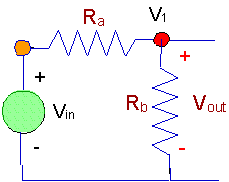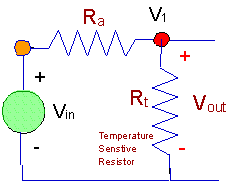Imagine:
-
You're designing a piece of
audio equipment, and you need a volume control. You insert a "pot" - short for
potentiomenter - into your circuit. The pot has a knob that will
eventually let you adjust the volume.
-
You're designing a measurement
system for measuring small deflections in a cantilevered stairway in a
performing arts center. You buy a strain gage and use it to measure the
deflection as loads are applied to the stairway to test the stairway.
-
You're measuring rotational
velocity in a motor, and you use a resistor-capacitor combination to "filter"
out the noise you experience in the tachometer measuring velocity.
These three situations have something in common. The circuitry you use in
each of these situations will be some form of a common circuit - a voltage
divider.
Goals
The goals for this lesson
unit are:

Given a voltage divider,

Be able to predict the output voltage from the divider given the
input voltage and values for the two resistors in the divider.

Be able to determine how the output voltage from the divider
changes when any of
the resistance values change.
Voltage Divider Analysis
Just above, we presented three different places where voltage dividers were
used.
-
The first - the potentiometer -
is a variable voltage divider and it is often used in volume controls, gain
controls and other situations where an operator wants to be able to control some
variable in a continuous fashion.
-
The second example involved a
strain gage and that sensor is very often used in a bridge circuit which is
really two voltage dividers.
-
The third example - a "filter"
is an example of an AC voltage divider. You're going to need much more
background in AC analysis before we can discuss filters meainingfully, but it
gives us something to work toward.
In this lesson we will examine the simplest possible voltage divider, but let's
remember that it is just the starting point for a whole family of circuits
derived from it including bridges and filters. Here's a circuit diagram of
a very basic voltage divider. It consists of two resistors, Ra
and Rb. Those two resistors are in series. An input
voltage is applied to the series combination and an output voltage is measured
across one of the two resistors.

The output voltage will be some fraction of the input voltage, and the fraction
is controlled by the values of the two resistors. Our first goal is to
understand how the output voltage, Vout, depends upon the input
voltage, Vin, and the values of the two resistors, Ra
and Rb. We'll examine this problem and solve for the
output voltage by using what we know about resistors and Kirchhoff's Laws.
We'll guide you through this with a few questions.
Question
Q1.
How much current (Iseries) flows through the series
combination of Ra and Rb?
Once we find that current, then we can calculate the output voltage using Ohm's
Law. You have to notice that Ra and Rb
are two resistors in series and divide the input voltage by the series
equivalent.
Then, once you have the current you can find the voltage across either of the
resistors because you know Ohm's Law. Doing that you should find the
following expression for the output voltage of the voltage divider.
-
Iseries
= Vin /( Ra + Rb )
because the two resistors are in series if no current is drawn from the voltage
divider circuit.
-
Vout
= Vin Rb/( Ra + Rb)
because the voltage across the resistor can be obtained using Ohm's law.
Using a Voltage Divider to Measure Temperature
Let's say you want to measure a temperature. There are lots of devices
there that vary somehow as temperature changes. One device is called a
thermistor.
There are other devices somewhat like a thermistor - except that they measure
other physical variables - not temperature.
-
A
photoresistor
changes value when incident light intensity changes. It's used to measure
light intensity in cameras, for example.
-
A
strain gage changes values when it is stretched.
It's used to measure strain (small elongations due to stress) in bridges,
buildings, parts of aircraft and many other areas.
Anyhow, you can use a thermistor to measure temperature. However, often
you don't want to measure resistance. A voltage change is often easier to
measure and display - compared to a change in resistance value. A voltage
divider is a circuit that can be used to convert a resistance change to a
voltage change.
Here's a voltage divider circuit.

In this circuit we have the following:
-
A thermistor, shown as Rt.
-
A constant input voltage,
Vsource.
In the voltage divider circuit we can note some important facts.
-
As Rt
increases in value the output voltage increases in value. If Rt
decreases in value, the output voltage decreases in value.
-
There are some temperature
sensitive resistors that increase in value as temperature increases, but a
thermistor has smaller resistance as it heats up.
Let's look at a typical situation to get started. We'll assume that we
have a thermistor that has a resistance of 5000W
at 25oC. That turns out to be a typical thermistor. For
this thermistor, we have the following values of resistance at the temperatures
shown in the table below.
|
T (oC)
|
R (W )
|
|
0
|
16,330
|
|
25
|
5000
|
|
50
|
1801
|
|

